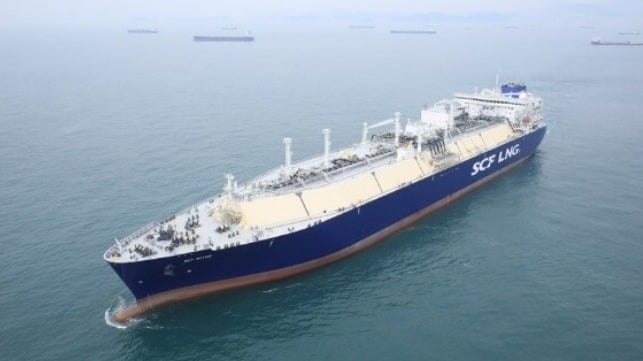Efforts to Curtail Russian LNG Exports Grow as UK Imposes Vessel Sanctions

For the first time since the UK created the power to sanction individual vessels, the government announced efforts targeting Russia’s growing LNG exports. The UK followed the lead of the U.S. designating four vessels and two managers previously listed by the U.S. as well as an additional LNG from Sovcomflot’s fleet that appears to be jumping registries in the emerging shadow fleet of gas carriers.
Two of the vessels that were sanctioned, Pioneer (77,712 dwt) and Asya Energy (79,885 dwt) jumped this year to the registry in Palau and are listed as being managed from India. Two of the others, Nova Energy (85,600 dwt) and North Sky (88,800 dwt) are registered in Panama, but the second one is a new vessel delivered this year which has already moved between Palau and Panama. Each of them was already listed by the United States as well as the managers Ocean Speedstar Solutions and White Fox Ship Management.
The UK extended the list to also include the former SCF La Perouse (92,900 dwt). Built in 2020, the vessel recently dropped SCF from its name and switched from the registry in Palau to Barbados.
The UK notes it is working alongside allies to bear down on Russia’s attempts to bolster the LNG trade. According to the UK Foreign, Commonwealth and Development Office and Stephen Doughty, Russia plans to expand its LNG revenues from exports. They contend the Russian goal is to reach a 20 percent market share up from eight percent.
There have been multiple reports citing Russian efforts to assemble a shadow fleet of LNG carriers similar to the tankers for the crude trade. This comes as Russia is starting exports from the Arctic LNG 2 project, which has been the target of Western sanctions. The U.S. targeted the project started in 2023 including suppliers and companies contributing to the construction.
Belgium, one of Europe’s largest LNG imports from Russia however says the European Union has not done enough to interrupt the LNG trade. Speaking with the Financial Times, Belgium’s energy minister Tinne Van der Straeten is calling for more action by the EU. She explained to the Financial Times that the EU must take action to make it possible for companies to get out of their long-term contracts.
Van der Straten told the Financial Times many of the contracts run for a decade or longer. She said it is up to the EU, and that Belgium would advocate for these steps, to create the grounds for companies to break the contracts and end Russian LNG imports.
The Financial Times cites data showing the number of LNG carriers doubled to a month arriving in Rotterdam during the summer.

that matters most
Get the latest maritime news delivered to your inbox daily.
The UK said its actions are aimed at interrupting the source of funding from the LNG exports. They contend since it along with the U.S. and EU placed sanctions against the Russian LNG sector and specifically Arctic LNG 2 that Russia has been forced to slash production.
Since enabling the sanctioning of vessels, the UK government has listed 15 vessels and entities involved in the Russian LNG sector. Announcing these moves they said the government will continue to “bear down” on Russia’s LNG exports.
